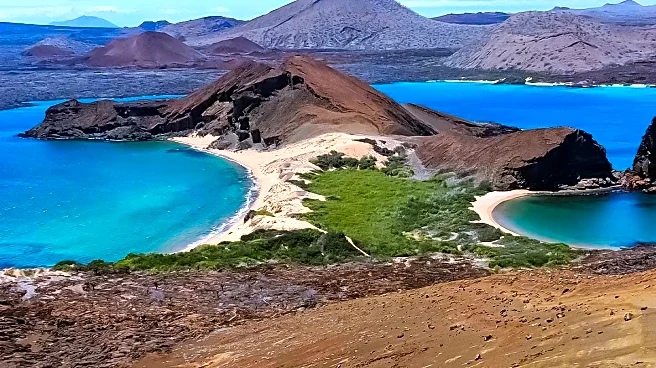What is the story about?
What's Happening?
The Galapagos Islands, a UNESCO World Heritage Site, are facing challenges due to uncontrolled tourism. The surge in visitors, facilitated by platforms like Airbnb, has boosted the local economy but poses risks to the islands' delicate ecosystems. In Puerto Ayora, the most populated town, tourism has led to crowded beaches, increased waste, and pressure on limited resources. The situation highlights the paradox of tourism supporting the islands while potentially endangering the environments that attract visitors. Despite existing regulations, lax enforcement has led to a rise in informal accommodations, threatening the islands' unique biodiversity.
Why It's Important?
The situation in the Galapagos Islands underscores the challenges of balancing tourism and environmental conservation. Uncontrolled tourism can lead to ecological strain, biodiversity loss, and economic disparities, affecting the islands' unique character and global significance. The situation highlights the need for sustainable tourism policies that prioritize environmental protection and community interests. The developments in the Galapagos may serve as a cautionary tale for other fragile ecosystems, prompting discussions about the role of tourism in conservation and the importance of preserving natural heritage.
What's Next?
Efforts to address uncontrolled tourism in the Galapagos may involve stricter regulations, improved inspections of accommodations, and environmental education for tourists. The situation may prompt advocacy efforts to promote sustainable tourism practices and protect the islands' unique ecosystems. The developments in the Galapagos may also lead to broader discussions about the role of tourism in conservation and the importance of preserving natural heritage in the face of global tourism trends.
Beyond the Headlines
The situation in the Galapagos raises broader questions about the impact of tourism on fragile ecosystems and the responsibilities of governments and communities in managing tourism growth. It highlights the potential for tourism to contribute to ecological strain and biodiversity loss, prompting discussions about sustainable development and environmental conservation. The developments in the Galapagos may serve as a cautionary tale for other fragile ecosystems, prompting discussions about the importance of preserving natural heritage in the face of global tourism trends.

















